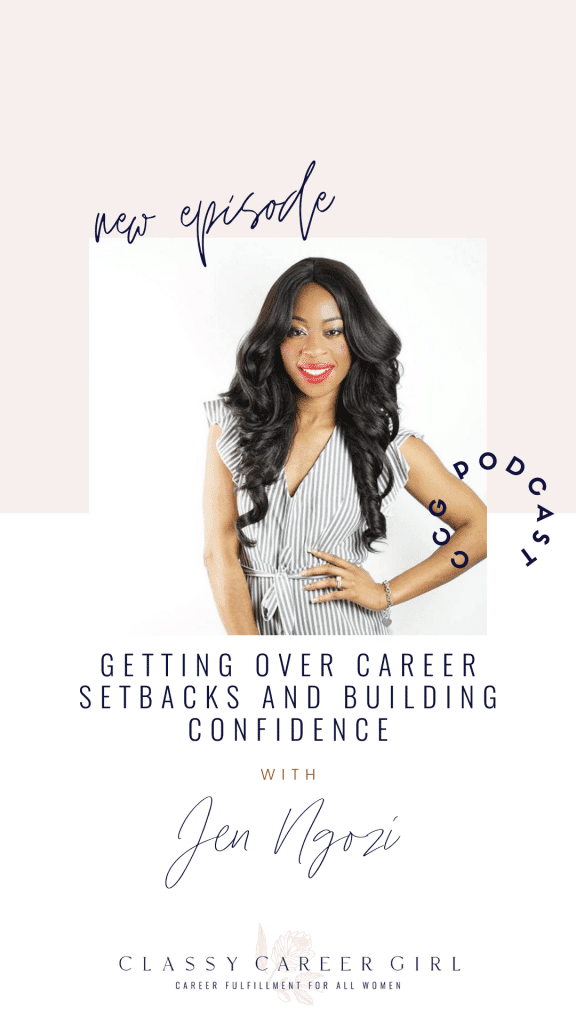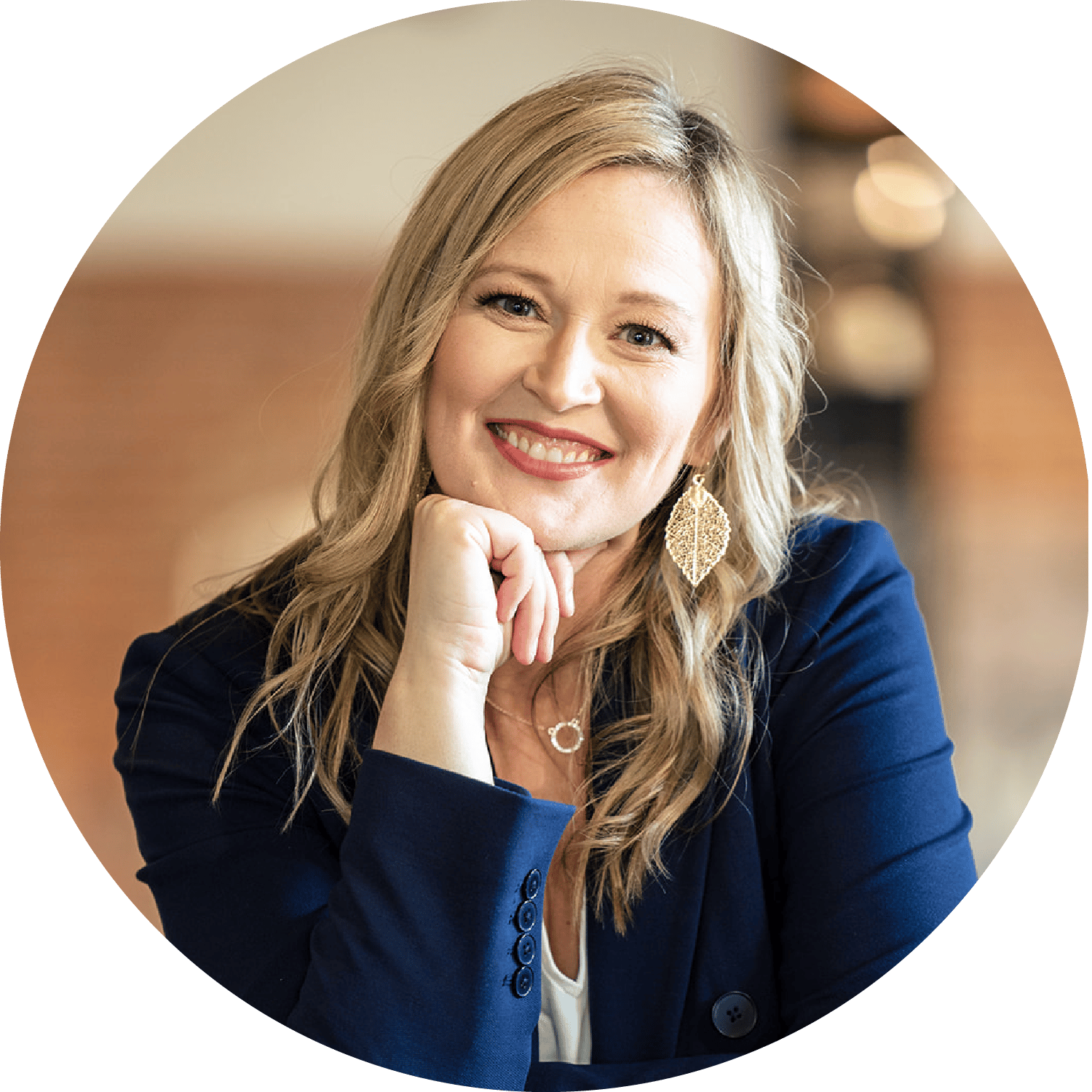Today I have such a great guest that I am so excited to introduce you to if you are feeling like you are having a career setback. The woman you are about to meet is a former recruiter and she shares a ton of inside information about the hiring industry right now. How should you network during the pandemic? That’s exactly what you are going to learn as well as how to get past career setbacks and make a comeback.
How To Get Over Career Setbacks and Build Confidence
Subscribe on your favorite platform below:
iTunes | Google Play Music | Stitcher Radio | TuneIn | iHeartRadio | Sound Cloud
Today our guest is Jen Ngozi, a global speaker, career expert and founder of NetWerk®, a global women in leadership movement and organization. We share very similar passions of helping women with leadership and confidence and wait until you hear her story of entering the workforce as a first-generation immigrant and her advice to other women who are first leaders in their families.
You are going to love this inspiring conversation and even learn that if 70% of jobs aren’t posted publicly, how do you even network?
Jen Ngozi
Global Speaker & Career Expert
NetWerk® Society Career & Leadership Development Membership Community
IG: @jenngozi
Here’s what we covered in this episode:
-
Advice for women who are the first leaders in their family.
-
Self-promotion and making your comeback.
-
Learn what should someone be doing right now if they have had a tough year and want to make a comeback.
-
How you can bounce back from career setbacks
-
Tips on how to make a career change in these tough economic times.
-
What are the right and wrong way to do networking.

TRANSCRIPT:
Note: Please excuse any grammatical errors as this transcript was generated by a computer. 🙂
Anna (00:02):
All right. Welcome, Jen. I am super excited to have you here with us today. Welcome. Thank you. It’s great to be here. Super excited. Awesome. So tell me a little bit, let’s start out with your career journey. Tell me a little bit about your career journey and some of the gaps that you were seeing in the workforce. Yeah,
Jen (00:20):
Super. So, you know, when I started my career, you know, I realized it’s almost like they say that you don’t know what you don’t know. And that was exactly the case for me. There was so much, I often just didn’t see or wasn’t exposed to. And a lot of that started with my upbringing. You know, when I grew up, I was, came from immigrant families, so my parents didn’t work corporate jobs. So there was a lot that they just couldn’t teach me because they didn’t have that exposure to. So I remember when I started my career, I, I had this thinking that if I put my head down, if I work super hard, almost like when you’re in school, if I get straight A’s and I do really well, I’m going to get, I’m going to pass and I’m going to do really well in school.
Jen (00:58):
And I realize a lot of my upbringing and a lot of what immigrants tend to teach their kids. And a lot of what I did in school wasn’t necessarily translating to the workforce. So I found myself often working hard and doing things and feeling like I wasn’t being rewarded for it. And I realized what I didn’t understand is what people get rewarded for. And that’s typically going above and beyond putting themselves out there, establishing a relationship and being known and self-promoting and putting ourselves out there. Those were a lot of the gaps that I have when I started my career. These are not things that I ever saw or was ever taught. So I realized I, I just didn’t know what I didn’t know.
Anna (01:34):
Yeah. You think you’re going to get rewarded for all the working hard, but really you have to put yourself out there. Exactly. It’s different. Yeah. So what advice do you have then for women who are the first leaders in their family? Like you were
Jen (01:47):
A lot of things. And the first thing I would start with is being patient with yourself. It’s so important to understand what a unique position we’re in when we were the first of anything is that it’s almost like we’re going to take one for the team. We’re going to deal with a lot of things that people before us never weren’t supposed to. So having that grace and that patience with yourself is the first step. Secondly, is it’s super important to establish a tribe and a community outside of your immediate family and front circle that can help you pinpoint some of the blind spots that you had. For me, that was the case. I took advantage of mentorship and programs in the community for young founders or first- generation students. And it really helped me to see and fill in a lot of the gaps of things. I just didn’t understand in my career. A lot of times we may not have those mentors and those role models in our immediate circle. So it’s really important if you’re the first leader in your family to get outside of your immediate circle and tap into resources that may not be already in your immediate
Anna (02:50):
Yeah. That’s this podcast too. So other people can learn from you as well. So what would you say would be something a mentor told that was like life changing or career changing that you remember to this day?
Jen (03:04):
Oh, it was so many, honestly I leaned on, in, on my mentors so much one, I would say that really stood out, was helping me to understand my blind spots. One thing they said was, you know, you can work all day every day, but remember that your hard work will not speak for itself. You have to speak for your hard work. And it was one of the best advice that I got because I have this mentality that, you know, I want to be humble. You know, my culture I’m from Nigeria. So in my culture, we’re talking ability and how valuable it is to be a humble person. But I realized that by I being humble and thinking, well, you know, if I just work hard and I do all the right things, people are just going to notice me. Right. And that doesn’t happen. So my mentor told me to make sure that you’re not relying on your work to speak for itself. You you’re putting yourself behind that. You’re showing up for your work equally. So that was probably one of the most career changing advices that I ever got was to stand behind my work.
Anna (04:00):
That’s so good. And you talk a lot about making a comeback and I know that’s something that our audience right now is trying to do, right? We’ve had a tough year. We’re trying to make a career comeback. I’d love to know like what just someone be doing right now. If they’ve had that tough year and want to make a comeback.
Jen (04:19):
Great question. Because so many of us are just, you know, feeling a little bit flustered with everything that’s going on. So the first advice I would say is take time to allow yourself to feel those emotions and get them out and just pinpoint once you’ve gotten those emotions out, put a timeline in place for yourself where you’re going to pinpoint some of the lessons that you’ve learned from a lot of the setback, setbacks are not necessarily always a bad thing. I found that in my career, they’re often redirection. So I would say the first thing is just adapt your attitude about setback and not necessarily look at it as it’s it’s the end, see it as a stopping point in your journey. And it’s not the final destination. So for me, it starts with attitude redefining how I view setbacks and then setting a timeline where I’m going to strike the lessons out of the setback, because they could be valuable if we apply it to something positive.
Jen (05:16):
Once you’ve taken the lessons, when you’re starting to plan your next move and how you’re going to achieve, whether it’s a career comeback, or if you’re changing career roles, or you’re walking into a new field, ask yourself what lessons can I take out of that? And then apply it to that new space that you’re trying to enter. That’s how I’ve found that setbacks can be somewhat productive, is if I’m taking it and then applying it to something that’s more positive and I’ll give you a tangible example. So, you know what he means? And there was a time where I was looking to get promoted in a role. And even though that role was not necessarily the perfect fit, I just wanted to get promoted. I felt like, well, that’s just obvious next move. And I saw that by being passed up on that promotion, I was able to take notice of those that were being promoted and the things that they were doing.
Jen (06:03):
Right. And I was able to buy time to start a scholarship relationships in another department at the company I was working for at the time. So rather than being promoted and being distracted, being promoted, a new role, I was able to take time and get out and tap into that new department with the new resources and apply the lessons that I learned from not being promoted in that role to being eventually promoted in that next department. And that promotion came directly through a lot of networking that I did during lunch breaks and after work hours in order to get to that next role. So for me, I see that as an example of, Hey, you know, I didn’t get promoted that stuff. Got it. But I didn’t let that crushed me. I took the lesson from that and what people were doing right. That were being promoted. And then I applied that to a different situation, which ended up being a better fit for me. Anyways.
Anna (06:50):
I love that. I love that. So it’s redirection. It doesn’t have to be like a career end, but you’re just going to redirect and use those lessons that you’re learned to find something better. Maybe even like a better career fit for you then than you thought that promotion would have been too.
Jen (07:07):
Exactly. Sometimes we think these things are like the end of the world. But one thing I found is that if you just commit in your mind that, Hey, I’m going to win, regardless. It may not necessarily happen today or tomorrow. It may not always happen immediately, but I’m going to make sure that everything that happens to me align somewhere and it’s serving some value later on in the future. That’s what I found that’s helped me. Exactly.
Anna (07:29):
So on Instagram this morning, I got this question. And I’m curious how, how, what you think because of
these, it’s basically any tips on how to make a career change during these tough economic times.
Jen (07:44):
I like, I like it and it’s so relevant. I mean, so many of us are now starting to realize that, Hey, you know, we have so many skills. We don’t have to stay in the same lane, our entire careers. I think as someone who’s made career changes myself network as a career change, I found that transferable skills is really what you should be focusing on. And what I mean by that is oftentimes we’re doing things and we don’t realize that those same skills that we’re using can easily apply somewhere else. For example, being a leader, being someone who can drive projects and drive initiative, that is a great skill in any field. And I it’s something I did when I was in consulting. And it’s also something I do in my own organization. Now, another example for that could be social media. Some people use social media for fun to hang out with friends and family.
Jen (08:35):
But if you’ve gotten really great at social media, guess what people are building entire careers on social media now. So don’t underestimate a lot of those things that you’re doing and how transferable it can be. And then another thing I would recommend is tap into your inner circle to understand where some of your blind spots are. Because oftentimes I know also women, we tend to do this a lot. We tend to like, not think things are a big deal or almost downplay things that we’re really great at. But when you start to recognize, sometimes that your mind can lie to you and that sometimes are better than you think at certain things. That’s where having a loving and supporting community around you come in handy. If
you start to notice, well, what am I being told often that I’m really great at what are my friends constantly complimenting me on?
Jen (09:21):
I’m like, Oh, that’s not a big deal. The reason why it’s not a big deal to you, because it probably comes very natural to you. Those things that you’re doing really naturally really well could easily translate into another career field. So transferable skills, thinking about what things maybe come naturally to you, what advice will compliment. You’re constantly getting collect all of these, put it into a journal of some sort and then evaluate, well, how can these help me in my next career? Don’t always think that you have to have all of the skills and necessary to, to move into another space. I started my career. A lot of what I was doing was recruiting and I’m always so blown away of how many offers I’ve made to people who barely met all the requirements. And I realized that the people that we typically made offers to, they all had one thing in common.
Jen (10:10):
They have a lot of confidence and they knew how to pinpoint things that they were great at and recognize their transferable skills. They weren’t necessarily the most brightest people ever all, oftentimes, you know, people have skills and brightness is subjective. Some people are really great in some areas, but some areas they may need a little help. That’s okay. Recruiters understand that you’re human. And there you’d be surprised how many times they’re willing to take chances on people who just have a lot of confidence and really believe in themselves. So that’s some advice I’d give to someone who’s job searching and trying to make a career field. Don’t give up. There’s a lot of opportunities out there. I may not always seem like it, but sometimes it’s going to take you believing in yourself and stepping outside of things that you might’ve normally been considered for.
Anna (10:51):
I love that. Thank you for sharing that, your experience as a recruiter, because I know some people think, Oh, I haven’t met all these requirements. I’m not even going to apply. You know, so you’re saying apply, you know, you, you might be the one pig, so, so what, what did they have? What confidence did they have or how did they show that confidence and how can our listeners show that same confidence to get that job even without all the requirements? Yeah.
Jen (11:16):
I’ll use that front of mine. For example, I referred a friend to a position and I was nervous referring him because I knew he didn’t really qualify, but surprisingly he tapped in before his interview. One thing he did was he got to know the lingo of the department that he was interested in learned the financial terms that they’re reusing learned the behind the scenes, learned the cultural aspects of the company and try to make sure that he was a fit. When he came. He made sure to use the same lingo, to understand the culture and make sure that he’s highlighting ways, that he will be a value add to the culture. So he did his homework. That’s one. He, even though he knew he wasn’t 100% qualified, he was able to really showcase the areas that he did really well and make that link between his past experiences and the role that he wanted.
Jen (12:07):
Although it wasn’t a perfect match. He was able to say, Hey, I’ve done X, Y, and Z. And therefore I could do this because these two tasks, although they were not exact, they’re somewhat similar. So he was
able to make a link between past and current experiences. He was able to really do his homework. He was able to understand the culture and know how to show up in a way that he could see the direct alignment between him and the culture of the company that he was trying to interview, which was the company I was there for. And we ended up making him an offer, even though again, he wasn’t completely qualified for the job.
Anna (12:38):
Oh, I love it. That’s awesome. And so what do you, so if they have the confidence, what do you think when it comes to networking then? Cause you say 70% of jobs aren’t posted publicly. So as a recruiter, like what were you seeing? How are, how do you, how do you get that job then? How do you network and find those jobs if they aren’t posted publicly
Jen (13:01):
Good question. I would start with being bold. So being bold is it could be scary. It could be scary. We’re always thinking, well, I don’t want to reach out. I don’t, I don’t want to bug this person. Reach out, reach out. Yes. Recruiters get a lot of messages. I do still have a lot of friends who are in the Korean industry and they are swamped right now, but don’t be afraid to reach out to people that you don’t know. Don’t also be afraid to go back into your past and think through, Hey, I went to school with this person, or I did this project with this person, or I volunteered some friends. You have to close. I get creative and think about spaces where opportunities can be. They may not necessarily always be like in a corporate setting. Like I may not necessarily always be your former colleague or someone that you went to school.
Jen (13:45):
This could be someone that you ran track with, or that you went on a vacation or that you met while studying abroad. I’ve seen connections happen that led to opportunities that didn’t come from always traditional spaces. You know, think about hobbies that you have, that you can get back for me, that’s dancing and going to dance events and dance. You’d be surprised how many people that they’re there in order to escape. But in reality, those relationships can lead to other things. So I’d recommend getting creative in places that you’re doing your outreach. Yes, you can do it. Social media. You can definitely obviously do it on LinkedIn on Instagram, but I say the more visible and the more you put yourself out there, the worst people can say is no. And I feel like if you always have that attitude, that will, you know, if I don’t ask, then the answer is always no.
Jen (14:32):
And if I ask the first thing that there can say is no having that, almost like the fearlessness is really helpful. Your search another way is to connect with recruiters and just to develop that ongoing relationship with them even when you’re not in a job search. So one of the things that I found that’s been helpful for me back when I was in human resources and consulting is just to have a Rolodex of recruiters that are constantly sending Thanksgiving notes to Christmas notes, happy Easter, remembering their birthdays, or lounging them to send me job opportunities and I’d share it with my network. So I’m consistently helping them and being a value to them, even though I’m not personally in my job search yet. So that the day that I am in my job search, obviously I come first to mind. They know me, I’m consistently reaching out, even when I don’t need anything and finding ways to help and support them.
Jen (15:25):
Recruiters need you as bad as you. So the more that you can have that be a win-win relationship, it’s very helpful. And even if you’re in a job search, now you can even start to find ways to help recruiters. Hey, I’m not this, I’m not a fit for this job, but I’m happy to share it with my network. So that way you can start to be seen as stand out as someone who’s a helper and not necessarily always just wanting help. It’s normal that people typically bombard recruiters and they want a job. So you’ll really stick out. If you’re someone who’s just constantly helps them and helps them and develops that relationship over time. That’s so good. Yeah.
Anna (16:02):
And helper. So you said that recruiters are busy, so that means there’s there’s jobs out there that are open. Right? Definitely. And I think some people think, no one’s hiring. I’ve gotten that comment as well, too. It’s all good. They’re all coming out with all this. There’s no jobs available. There’s no one’s hiring. So from your recruiting friends, tell me third jobs are available. Yeah.
Jen (16:26):
There are jobs available. And then also keep in mind, like we mentioned earlier, there’s the hidden job market. So there’s opportunities that they would consider if they could, but they may not necessarily post it. Or this could be open on the low that’s a, that was a big one when we fill jobs without even really ever posting it. So that’s where having those relationships come in handy having a foot in the door and how you can create that is to start to connect and network with people before you need a job. If you’re in the job search right now, asking to speak to someone who’s in a position that you may want to be at, that’s a strategy that I’ve used in the past. It was a role that I was looking for in a company. So I found someone who already had that role and I developed a relationship and asked her about her career and her experience. And, you know, we really hit it off. She ended up referring me. I did get the job. So it, it just helps to always think creatively. It doesn’t necessarily always have to be. The recruiter can be the hiring manager. It can be someone who’s on there that in that role, it could be someone who even left that company that you want to go into.
Anna (17:25):
Okay, awesome. So what would it be, what would be the wrong way to network or contact a recruiter?
Cause you’ve kind of told us the right way, which is helping them. What’s what’s the wrong way.
Jen (17:37):
Oh, where can I start with that? I would say you want to be patient, so I wouldn’t necessarily send so many messages to the same person saying the same thing. I have to say that’s the wrong way just because they do get a lot, that’s easy way to just kind of get ignored and being even blocked. So I would avoid that. I would also avoid sending the same recruiter, the same thing. So it’s almost like they say, you should customize your job application or your resume. Same goes with recruiter. If you know that there’s a position that you’re applying for, I would make sure to tailor your resume in a way that appeals to that recruiter and what they’re hiring for. So for example, for recruiters, hiring for finance positions, and you’re not a finance person and your resume and your background, doesn’t quite align, I wouldn’t necessarily be sending that your resume to that recruiter consistently. I’ve researched them and make sure that, you know, the kind of roles that they recruit for and then share your resume. And if you’re not sure, it’s okay to just ask too and ask, Hey, if you’re not the right person, what’s the best way. Or if I would appreciate it introductions to the right person. Awesome.
Anna (19:27):
Awesome. So what’s your final word of wisdom for our audience today about changing their career?
Jen (19:37):
My final piece of advice would be to have grace on yourself and have extreme patience. We are stressed right now because we are going through unprecedented times. So what you’re what’s you’re experiencing right now is not the norm. So assure yourself that it’s not you, it’s things that are way beyond your control. So having that extra set of grace and patience with yourself is really important right now. And also don’t always feel like you have to do it alone. We all need a little bit of help. I had a lot of help as I spoke about earlier, a lot of mentors, a lot of programs. I’ve always connected with people that were where I wanted to be never shy away from reaching out and developing a community for you. It’s going to be the difference between you running around doing the same thing over and over again, with no results with then, with you, having someone who can help you identify your gaps and your blind spots, which has been so helpful for me. So that’s what I recommend is have patience be kind to yourself and definitely develop your tribe because you’re going to need them especially right now.
Anna (20:42):
Yes. Yeah. Good. Awesome. Well, thank you so much, Jen, for being here with me today, this was great.
Jen (20:49):
Thank you, Anna. It’s been awesome.
Anna (20:52): You.





